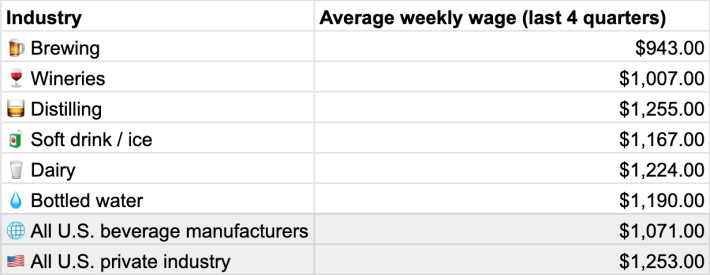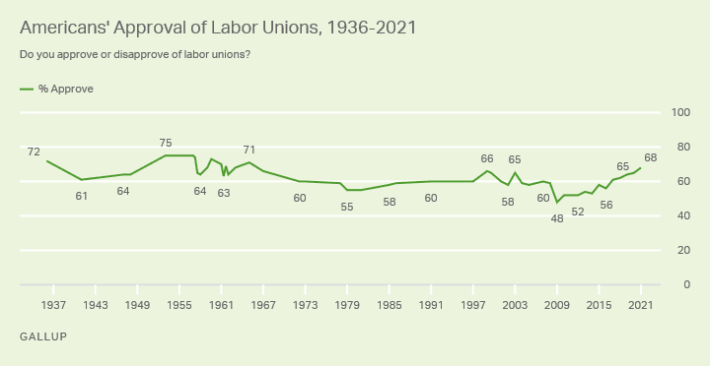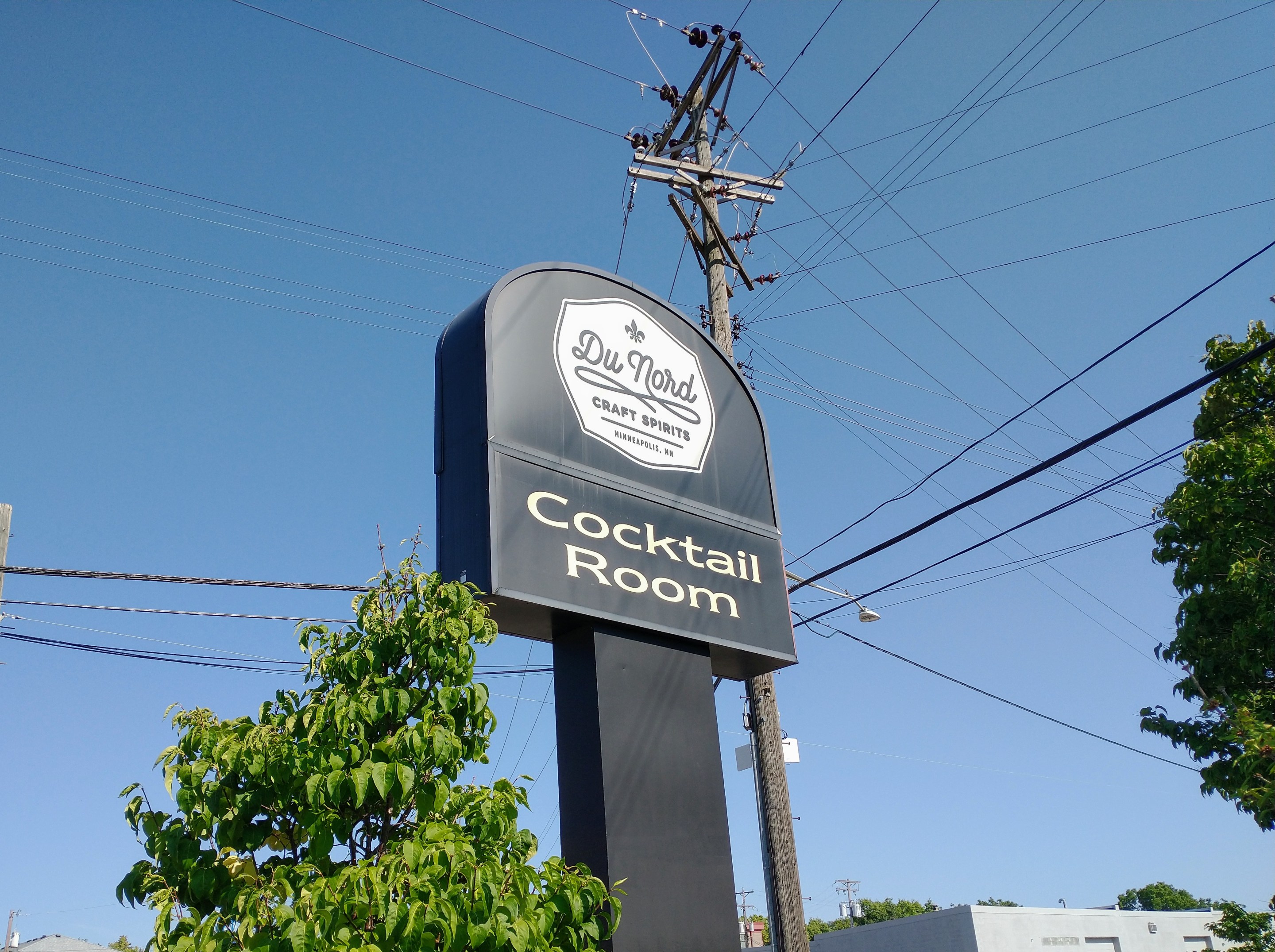This story originally appeared on Fingers, an independent drinks newsletter by Dave Infante.
L. Kling’s first job in a craft distillery will also be their first union job in a craft distillery. After working part-time making hand sanitizer in 2020 at Minneapolis distillery Du Nord Craft Spirits, they were hired full-time as a production lead this past February. By mid-June, Kling and their five coworkers had gone public with their union drive, and shortly thereafter, the company’s owners voluntarily recognized the workers’ right to bargain collectively.
“I was just inspired by other union drives,” Kling says. “It showed me that it was possible.”
There’s been plenty of inspiration. Over the past year and a half, the Twin Cities has emerged as the country’s most promising hotbed for unionizing the craft beverage industry. Pummeled by the coronavirus pandemic, workers at distilleries, brewers, and coffee shops throughout the metro launched union drives at a clip never before seen in the fractured, vast, and tricky-to-organize hospitality sector.
Not all those drives were successful, but Minneapolis craft beverage workers have earned significant wins. In the process, they’ve begun building city-wide solidarity within their industry, and a template for how organizers and workers in other cities can win unions in breweries, distilleries, and other craft food & beverage producers.
“There are going to be ups and downs, no doubt about it,” says Anders Bloomquist, a warehouse specialist at Fair State Brewing Cooperative (which unionized almost a year ago to the day) and a member of the Twin Cities chapter of Democratic Socialists of America chapter. “But I think all of the foundational pieces are available for us to construct something very good very robust and very powerful” that can be replicated around the country.
“We have everything we need to win,” adds Kling.
Here’s a post-Labor Day look at how craft beverage workers in the Twin Cities, with support from ambitious organizers and pro-labor customers, are building a confident, cohesive, and powerful movement to organize the boutique booze business in Minnesota and beyond.
A unique challenge
No matter the industry, organizing a union in the U.S. is hard, tedious work these days. American labor laws heavily favor the bosses; schools teach limited, skewed versions of labor history; and unions themselves have been hobbled by declining membership caused by right-to-work laws, corruption scandals, and good-old-fashioned union-busting. Besides, the very concept of a stable full-time job has been steadily eroded to the point where exploitative labor models like “the gig economy” and “polywork” seem almost normal if you don’t think about them too hard. Shit’s bleak!
Craft culture—by which I mean the constellation of artisanal, high-end, and niche food and drink so defined by writer Lauren Michele Jackson in her 2017 essay—is not exempt from those forces. And organizing comes with additional hurdles for workers at the small craft beverage firms that produce the good beer, wine, and spirits you love.

Production workers face the “dream job” paradox, in which workers are so passionate about the product that they accept low pay, unsafe conditions, and poor treatment from customers and bosses, lest they lose the privilege of pursuing their passion to a more pliant replacement. Front-of-house workers—bartenders and servers in a taproom, for example—are told that their labor is replaceable and their jobs can’t be careers, which makes organizing a tough sell compared to just moving on to something else. (“I’m a millennial, so I don’t even know what a career is,” jokes Kling.)
Finally, these firms tend to be small, making workers vulnerable to the bosses’ “we’re a family” fallacy, and making it hard to attract support from cash-strapped unions that must be strategic with their limited resources. Organizing 10 breweries with 15 employees each is almost always going to be more time-consuming than, say, one hotel with 150 workers—costlier, too.
'Who organizes craft breweries?'
Despite that depressing calculus, there are some union locals (along with national union-adjacent bodies, like the Restaurant Opportunity Centers United and the DSA’s Restaurant Organizing Project) organizing in the craft beverage industry. In the Twin Cities, Unite Here 17 has taken a keen interest in the metro’s craft producers. “In having conversations with people in similar circumstances as mine who are trying to organize in other parts of the country, it’s definitely made me greatly appreciate Unite Here 17,” Bloomquist says. The local, part of the country’s largest hospitality union, “is dedicated to actively organizing [and] didn't scoff at a bargaining unit that was only a couple dozen people, [which] definitely happens in the world unfortunately,” he added.
Sheigh Freeberg is Unite Here 17’s secretary treasurer, and has worked for the union for seven years. After Bloomquist first approached him about organizing in 2018, he did some research. “I was like, ‘who organizes craft breweries?’ And the answer is: nobody was,” Freeberg says.1 In the Twin Cities’s prominent, growing craft brewing industry, the organizer saw opportunity.
“They do both production and they have front-of-house of hospitality, which is a Unite Here specialty," Freeberg says. "Most people know each other, and started working because the owners are not corporate, they’re not [Anheuser-Busch] InBev… but as places get bigger and they get bought up by the big guys, or they just become the big guys.”
Workers at those “big guy” macrobrewers are mostly union, Freeberg adds. Collaborating with the DSA, the ROC United’s Minnesota chapter, and craft beverage workers themselves, the organizer began laying groundwork. “I was like, ‘Let’s do this,’” he remembers.
The 'hot shop' spark
Twin Cities craft beverage employees at various shops had already been organizing when the pandemic hit. But laid-off employees of Tattersall Distilling Co., an award-winning producer that made the Inc. 5000 list in both 2019 and 2020 thanks to its rapid growth, went through the typically lengthy process at warp speed, spurred on by frustrations over the firm’s COVID-19 protocols. In June 2020, they connected with Freeberg, who helped them through a crash-course in “hot shop” organizing—so called because workers are all pissed off about the same thing and itching to take action.2
“Over nine days of intense organizing—a process that normally takes much longer—we worked with lawyers, union reps, and each other to develop our union,” Tattersall bartender Bennett Johnson told The Dish, a DSA publication focused on the hospitality industry, in a recap of the drive this past March. “Within a week, we were like, marching on the boss.”
Tattersall’s management would not voluntarily recognize the union, but pro-union workers won in an election anyway.
“I think since we were a small tight knit group who all had very similar goals we truly knew we would win,” says Tattersall distiller Penny Weiland. “We also had a lot of support within industry workers when we first announced we would vote, and that really helped.”
The moment was ripe for collective action, and not just because of the pandemic. “This is happening as shit’s still going down on the streets [during] the George Floyd uprising,” Bloomquist says. Workers who had been furloughed from craft beverage jobs joined neighbors and colleagues in the streets, doing mutual aid and experiencing firsthand the power of collective action.
“It really felt like something bursting,” Bloomquist recalls. “After enduring COVID for a couple of months, and with the way the presidential primary [turned out], at that point people were really ready for something, ready to feel like we have some agency in this world. Then Tattersall going live with their [drive], that was that was really it.”
Twin Cities advantages
Tattersall’s public drive gave way to a cascade of efforts in the months that followed. After Johnson, Weiland, and their coworkers marched on the boss in June 2020, five other craft beverage workforces in Minneapolis followed suit: Surly Brewing Co., Stilheart Distillery & Cocktail Lounge, Lawless Distilling Co., Spyhouse Coffee, and Fair State Brewing Cooperative. And almost exactly a year after Tattersall workers kicked off their drive, Du Nord’s workers joined the party.
For Kling, the support those 2020 craft beverage union drives3 received from industry colleagues, the broader Twin Cities labor community, and regular drinkers was invigorating.
“Watching the city react—I mean on social media I saw people [react to] what happened at Surly being like ‘I'm boycotting, I can't believe this is happening, I'm with the workers,’” they recall. “These people weren’t like activists or labor organizers, they were just people who recognized that workers should have some support. That really bolstered my confidence that people would have our backs.”
Sometimes, even broad support isn’t enough: Despite community backing, the drives at both Surly and Spyhouse were defeated in contentious elections. Pro-union Surly workers lost their drive by a single vote.
Food & Beverage Workers w/ Ilhan Omar: We Won a Union and You Can, Too! - How To Organize Your Workplace https://t.co/UL7IRftwXu
— Ilhan Omar (@IlhanMN) October 26, 2020
15.8% of Minnesota’s employed workers in 2020 were members of unions, making the state fairly pro-labor compared to the nation; the union membership rate across all U.S. workers is just 10.8%.4 But Bloomquist pointed out another advantage Twin Cities workers have when organizing: They’re in the middle of state’s power structure.
“I think what gets overlooked is the geographic element of this. All of the big stuff in the state is in one metro: the state capital, the biggest city, the main university, the main airport, most of the major businesses’ headquarters,” he says. “Even a moderate amount of organizing has bigger ripples”
Because workers are positioned to disrupt the state’s political, social, and economic systems.
Bloomquist is quick to acknowledge that none of the Twin Cities craft beverage drives ever rose to that level of disruption. (These are very small shops, after all.) But the workers’ efforts did make waves big enough to catch the eye of rising-star U.S. Congresswoman Ilhan Omar, who hosted a Zoom workshop in October 2020 on how their organizing tactics could be replicated throughout the food and beverage industry. Omar was joined by craft beverage workers from Unite Here 17 shops and San Francisco’s Anchor Brewing Co., who are members of the International Longshore Workers Association Local 6.
The next round
Will the momentum in Minneapolis (and St. Paul, sorry St. Paul!) proliferate into the broader craft beverage industry beyond city limits and Minnesota borders? It feels both possible, and necessary. If you read the Fingers newsletter, you probably don’t need to be told that it’s a particularly tough time for American workers. Wages are stagnant, the pandemic is still running, and housing costs are skyrocketing, often pricing hospitality workers out of the same communities where business owners whine about not being able to hire hospitality workers. Hmm!

The good news is that workers all over the U.S., whether they distill whiskey, nurse the sick, or report the news, are newly awake to all this bullshit. And they’re organizing unions at a pace not seen in decades. There were hardly any craft beverage unions when I began reporting on the intersection of beer and labor a few years ago;5 Tattersall’s successful drive made it (I think?) just the first unionized craft distillery in the entire country. But roughly midway through 2021, there are by at least a dozen.6 Many of those are in the Twin Cities.
Just last month, the union at Fair State Brewing Cooperative ratified its first-ever collective bargaining agreement. “Now that we’ve finalized our contract, we’re going to work on some educational stuff—both for our benefit, but also for the wider world—on what we’ve achieved with our contract,” Bloomquist says.
He hopes to roll that momentum into the start of many more, and both Bloomquist and his Twin Cities craft beverage comrades hope it’ll be a two-way street.
“Talk to other places that have unionized and how they won,” says Tattersall’s Weiland when asked what advice she has for other workers in the industry. “Everyone we talked to was extremely nice and happy to give advice and help in any way necessary.”
Du Nord’s Kling, who along with their coworkers is in the early stages of the bargaining process, echoes this sentiment.
“Walk the walk, don't just talk the talk, you know?" Kling says. "I feel like with organizing, if we truly are going to make our conditions better, it will make other people's conditions better because they will see us as an example.”
Though they’d had experience doing mutual aid and organizing around gender and sexuality issues, the Du Nord drive was Kling’s first go at labor organizing. Having seen what a drive alone can accomplish—bringing the industry closer, galvanizing the community, giving workers something of their own to be a part of—they’re looking forward to the bargaining process. And to more organizing in the future, too.
“I want to write zines and connect with other workers,” Kling says. “I am not white and I am not cis and I am not straight, and I know that there are other people out there in the industry [who I] haven’t really connected with yet. It’s exciting.”
1: Some unions are making inroads in the craft beverage industry outside the Twin Cities. Unions like the International Longshore and Warehouse Union and the United Steelworkers have led drives at breweries and other “craft” F&B businesses in San Francisco and Cleveland. And 300 workers at Milwaukee-based Colectivo Coffee recently won a nail-biter election to be represented by the International Brotherhood of Electrical Workers.
2: Contrary to what you might think, “hot shops” aren’t necessarily easier to successfully unionize. Some veteran organizers are wary of pursuing “hot shop” leads because they can fizzle when frustrated employees quit or decide they’re unwilling to commit to building the infrastructure that successful collective bargaining demands.
3: The drives at Fair State, Stilheart, Lawless, and Du Nord were met with voluntary recognition by those companies. Bosses forced elections on the rest, and some of those drives got pretty ugly.
4: Fun (not really) fact: South Carolina, where your fearless Fingers editor lives, has the lowest union membership rate in the country, at 2.9%. We want you to suffer and die :), etc.
5: This depends on how you define craft. Boston Beer Company inherited a few union shops when it bought breweries in the Midwest; Lagunitas workers in Chicago are repped by the Teamsters; and in Minnesota, August Schell Brewing Co., which makes Schell’s and Grain Belt, among others, has been union for over 75 years.
6: And more potentially on the way. In Cleveland, Great Lakes Brewing Company, Ohio’s biggest craft brewery and the country’s 22nd-largest by sales volume, went public with a drive with the United Steelworkers in late July, and Freeberg tells Fingers that Unite Here 17 is actively organizing other craft shops in the Twin Cities. (He declined to specify which because those drives were not yet public.)






